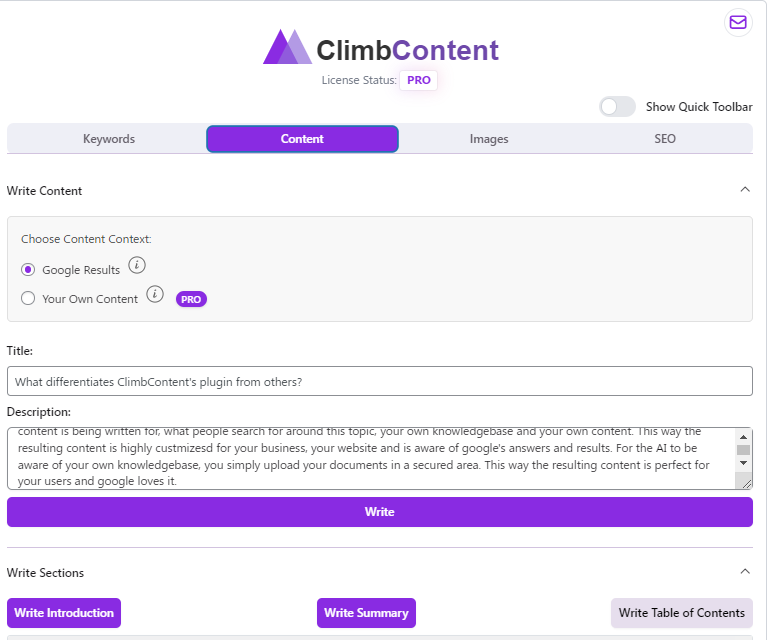Using AI for Content Creation - A Comprehensive How-To Guide
Content Creation with AI: Balance Speed & Authenticity! Discover the power of AI-human hybrids for engaging, emotion-rich content creation.
Table of Contents
- Introduction
- Exploring the Benefits of Using AI for Content Creation
- What does Google say about using AI for content creation?
- Can AI replace content creators?
- Using AI for Content Creation Concepts
- What differentiates ClimbContent’s plugin from others?
- Summary
Introduction
Using AI for Content Creation: The Power of a Human-AI Hybrid Approach Is there a role for using AI for content creation to craft engaging material? This question sparks much debate. AI can speed up writing and ensure consistency. It can also analyze vast data to create relevant material. But, it often fails to capture emotional nuances. While AI-produced content has its perks, the human touch adds irreplaceable authenticity and creativity. Quality checks are crucial to avoid errors and ensure relevance. A hybrid approach, blending AI efficiency with human insight, often yields the best results. Even Google acknowledges AI’s growing role in content. The tech giant stresses quality and relevance, warning against using AI solely to manipulate rankings. Originality and usefulness remain key. Google’s algorithms can spot and penalize low-quality, automated content. So, while AI can assist, human oversight is still essential. Can AI replace content creators? Not entirely. Machines are great for data-driven tasks but lack the emotional depth of humans. Creativity and cultural context are better handled by human writers. AI complements rather than replaces human skills. Enter the concept of Assisted AI. Here, you remain in control, using AI to articulate your ideas. Tools like ClimbContent.com’s plugin excel in this. It generates context-aware content tailored to your needs and preferences, enhancing both user engagement and search engine ranking. In summary, AI can boost your content creation efforts, but a human touch is key to success. Balancing AI’s capabilities with human creativity delivers superior content.
Exploring the Benefits of Using AI for Content Creation
Using AI to write content can be both beneficial and challenging. The technology enables faster production and helps maintain consistency. AI can analyze vast amounts of data to craft relevant, engaging material. However, it may struggle to grasp nuances and emotions effectively. Authentic human touch and creativity might get lost. Quality checks are essential to avoid errors and ensure relevance. Depending on your goals, a hybrid approach can be best. Combining AI efficiency with human insight often yields superior content. Careful consideration and balance are key to utilizing AI effectively in content creation.
What does Google say about using AI for content creation?
Google acknowledges the growing use of AI-generated content, emphasizing the importance of quality and relevance. They stress that content should be designed to meet users’ needs and provide valuable information. While not outright banning AI-generated material, Google warns against automated content purely aimed at manipulating rankings. The focus remains on originality, accuracy, and usefulness. Websites using AI should still prioritize human oversight to ensure standards. Google’s algorithms can identify and penalize low-quality, automated content. The commitment to delivering reliable and meaningful results remains paramount.
Can AI replace content creators?
AI has certainly made strides in content creation, but it can’t fully replace human content creators. Machines excel at generating data-driven pieces and handling repetitive tasks. However, creativity and emotional depth are areas where AI still falls short. Human experience and intuition play crucial roles in crafting engaging stories and compelling narratives. While AI can assist and enhance productivity, it lacks the personal touch that resonates with audiences on a deeper level. Additionally, cultural nuances and context are often missed by AI. So, while AI is a powerful tool, it will complement rather than replace human creators for the foreseeable future.
Using AI for Content Creation Concepts
When you give any latest AI model the task to create a piece of content, you are essentially asking it to “write” an article. However, to maximize value, you should focus maniacally on your own knowledge to provide real value to your readers. The best approach for this is “Assisted AI.” This means the thoughts, content, and flow are yours; you only use AI to articulate your ideas. In this way, you remain in the driver’s seat, and AI serves as a helper. ClimbContent.com plugin excels here. With it, writing an article isn’t a problem—ChatGPT or Claude will handle it. To do it in a way that search engines love and readers appreciate, you need a tool like the ClimbContent.com plugin. It provides intelligent suggestions based on what people actually want to read.
What differentiates ClimbContent’s plugin from others?
ClimbContent’s plugin leverages the latest intelligent AI models to generate “Context Aware” content. The AI always considers the target audience, popular search queries on the topic, your existing knowledgebase, and previous content. This approach ensures the content is highly customized for your business and website. To make the AI aware of your knowledgebase, you simply upload documents in a secured area. This way, the resulting content is optimized for your users and aligns with Google’s answers and results. The content created is perfect for both user engagement and search engine ranking.

Summary
AI can speed up content creation and improve consistency. However, it may miss emotional nuances and creativity. Google values quality and relevance in AI content but warns against using it solely for rankings. AI can’t fully replace humans due to its lack of emotional depth and context understanding. A hybrid approach, combining AI and human input, offers the best results. ClimbContent.com’s plugin supports this by tailoring AI to user needs and improving search engine ranking.